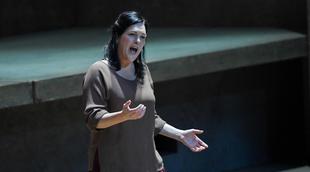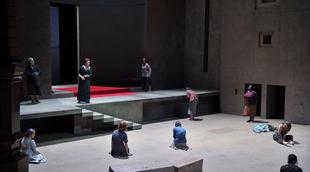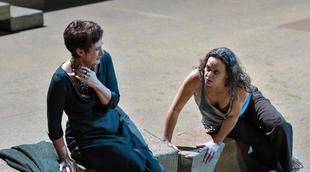 © Antoni Bofill
© Antoni Bofill
Staging Elektra at Aix-en-Provence’s Festival in summer 2013 was Patrice Chéreau’s last work, since the film, theatre and opera director died in October of the same year.
Having visited Milano, New York, Berlin and Helsinki, this production has finally arrived to Barcelona, with almost the same vocal cast that premiered it three years ago, who worked under direct orders from Chéreau himself. They are meeting again in Barcelona, for the last time it looks like, so we are truly looking at the operatic “testament” from the French director.
Chéreau’s Elektra is magnificent and it’s destined to remain a milestone, a reference, from now on unavoidable in the stagings of the great Strauss title.

Elektra © Antoni Bofill

Elektra © Antoni Bofill
Basically, what Chéreau has done is to further complicate things, transcend the primitive brutality of the myth, go beyond the elemental psychoanalytical stereotype that the characters tend to be approached from and humanises them. In Klytämnestra he looks for the mother who deep down wants to get her daughter’s love back, and in Elektra for a defenceless daughter that is still longing for and needs her mother’s cuddle, rather than a mere woman in a perpetual hysterical crisis possessed by a revenge drive.
Chéreau focuses in the relationship between mother and daughter that is at the core of the piece, but the humanising look extends to the other characters and contexts of the opera. In this sense, for example a detail such as the silent scene of the servants sweeping the courtyard just before the fearsome orchestral outbreak opens the tragedy is a great theatrical finding. The palace of the Atraidae isn’t only the extemporal immutable space where the events of a myth take place as if in a ritual ceremony, but is also a house where people live, a place that needs daily sweeping.
By humanising Elektra, Chéreau brings the piece closer to the audience, which in turn makes it even more disturbing.
The vocal team was close to ideal. Evelyn Herlitzius faced with immense energy one of the hardest, most tiring and difficult roles of the repertoire. Herlitzius performed Elektra with her voice, body, dance and look. Herlitzius was possessed by Elektra at all times.
Waltraud Meier, a veteran, who was recording this role with Daniel Barenboim as a conductor more than twenty years ago, was also an ideal Klytämnestra and filled her character with nuances. Adrianne Pieczonka was also very good as Chrysothemis, Elektra’s “bourgeois” sister, the woman who attempts to escape the chain of atrocities that surrounds the family through oblivion of the curse.

Elektra © Antoni Bofill
Thomas Randle managed to bring personality to a character that is theatrically important but musically anecdotal such as Aeghisth. Alan Held was also a good Orest, he was the only main singer who hadn’t participated in the original production.
Amongst the secondary characters, it’s important to highlight some singers who were great figures, such as Roberta Alexander as fifth servant and, most especially, Franz Mazura, an operatic legend, who being 92 still performed with dignity the role of Orest’s preceptor.
Alongside the singers, orchestra and conductor were also righteous winners of the night. Elektra, the most musically aggressive from Strauss’ operas and a piece that at points sits on the edge of atonality, is highly demanding on the orchestra, both in numbers as well as in the difficulty of the dense orchestration.
To balance this gigantic orchestra with the voices is a very difficult task and Josep Pons achieved it at almost all times, but also managed to find nuances and to highlight the lyrical melodies that often underlie the score. He also humanised Elektra and brought to practical application the statement by Strauss that his operas Salomé and Elektra should be conducted as if one was conducting Mendelssohn.
Photos credit: © Antoni Bofill
the 09 of December, 2016 | Print
Comments